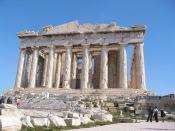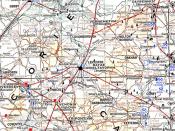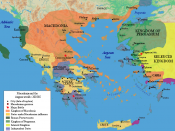The Roman's used an efficient form of diplomacy in the 2nd Macedonian war. Diplomacy continued to be their policy between the Macedonian war and the 1st Syrian war. They were able to gain the loyalty of various vulnerable Greek city-states to take on the current challenger of power. The Consul's or diplomats were able to lure the city-states into believing that they were the ones that choose to take action. Leaving the illusion of Rome as the heroic big brother that is providing the support for the liberation of Greeks and receiving nothing in return except friendship.
Philip V had angered the Romans by sending aid to Hannibal and signing a peace agreement with the Aetolians. (24) Rome wished to check Philip's power. It would have caused animosity if Rome would have just marched in and took Macedonia without first securing allies and coming in under the pretense of freeing the Greeks.
Fortunately, King Attlus and the Rhodians requested Rome to stop Philip from attacking the cities of Asis.
Prior to declaring the war, Rome sent out envoys to various allies to assure their loyalty and a guarantee they would not join Philip. King Ptolemy of Egypt received three envoys thanking him for his support in the past and giving him gifts of appreciation (bribes). Rome wanted to assure that Ptolemy would not support Philip his Macedonian kindred. Masinissa received envoys asking for his loyalty and the support of the Namibian cavalry, and in return Rome would "enlarge his dominions." (32) Roman consuls were able to convince the Rhodians and King Attlus to join in their fight against Philip. (47) At the Panaetolian Congress, Rome was assisted by the Athenians complaints of Philip to gain an alliance with the Aetolians. (47) The Romans declared in the assembly they...


